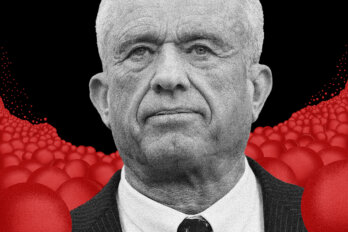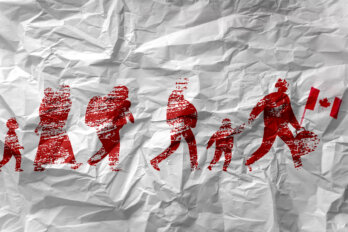It was only sixty years ago that people began to settle in Whale Cove—recently enough that some of the hamlet’s first inhabitants are still alive to recount the story of its origin. The Nunavut community is one of several towns the federal government created through forced relocations beginning in the 1920s. The reasons for the resettlements, which frequently resulted in tragedy, were varied and often misguided. During the Cold War, when the US and the Soviet Union threatened to encroach on Arctic territory Canada claimed as its own, the government relocated Inuit to the far North to establish its sovereignty. In some instances, communities were settled around trading posts or relocated when the posts were shut down. In the case of Whale Cove, now a town of about 400 on the coast of Hudson Bay, some of the first Inuit inhabitants came there in the wake of a devastating famine.
Listen to an audio version of this story
For more Walrus audio, subscribe to AMI-audio podcasts on iTunes.
Before the relocation, many of the displaced Inuit lived nomadically and relied on the migration of caribou to survive. Among them were the Ahiarmiut, an inland group of people, who were forcibly relocated several times, beginning in 1950. In 1957, despite warnings from the Ahiarmiut that the settlements chosen for them were not conducive to hunting, they were dropped off in another unfamiliar location with almost no provisions. Seven Ahiarmiut died from starvation that winter. (The Ahiarmiut would have to wait more than six decades—until January 22 of this year—for the federal government to issue an official apology following a $5 million settlement for its role in their displacement.) In 1958, seventeen Inuit died of starvation at Garry Lake, a community northwest of Hudson Bay, after government officials failed to respond to repeated warnings about the dire conditions.
That year, the government created a new permanent settlement along the coast between the communities of Rankin Inlet and Arviat, where it planned to build facilities such as a school and a general store. Inuit from across what is now Nunavut, including survivors of the famines, settled there, and the community of Whale Cove was born.
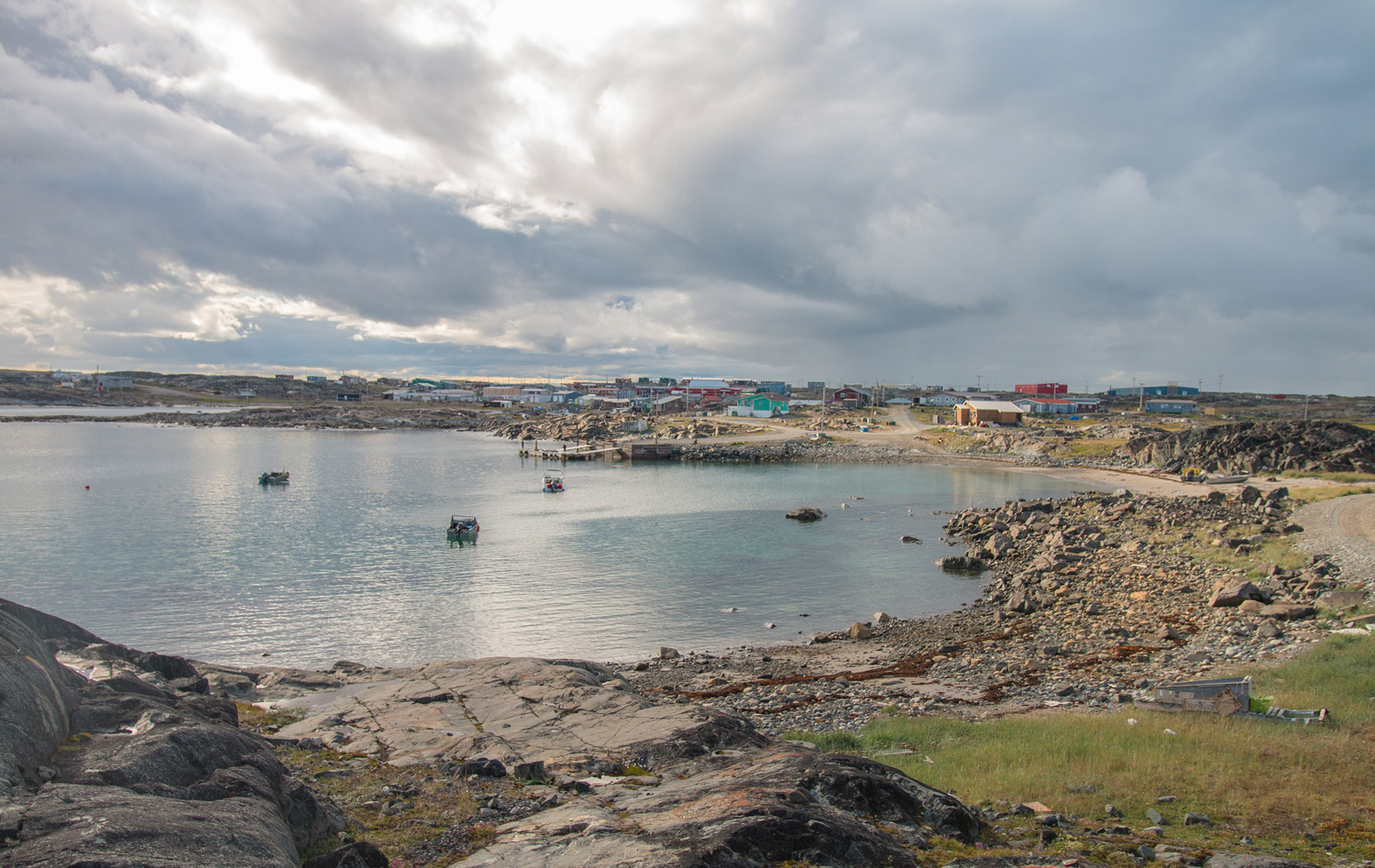
Last summer, I met the man who had delivered many of the community’s first residents there by boat. Lewis Voisey was born not far from where Whale Cove was eventually founded. Over black tea and bannock, the eighty-four-year-old seaman, an enthusiastic storyteller, recounted his travels up and down the coast and described several close calls with polar bears.
The tradition of elders speaking for hours, almost uninterrupted, remains a fundamental means of passing knowledge and family history from one generation to the next. Listening to Voisey’s stories, I realized that while some of Whale Cove’s official history may be documented in government records, these capture only a limited, outside perspective. For a more layered understanding, I returned to Whale Cove this past February with Suzie Napayok-Short, a friend and interpreter, to hear six residents share the community’s history in their own words. These are their stories.
—Cody Punter
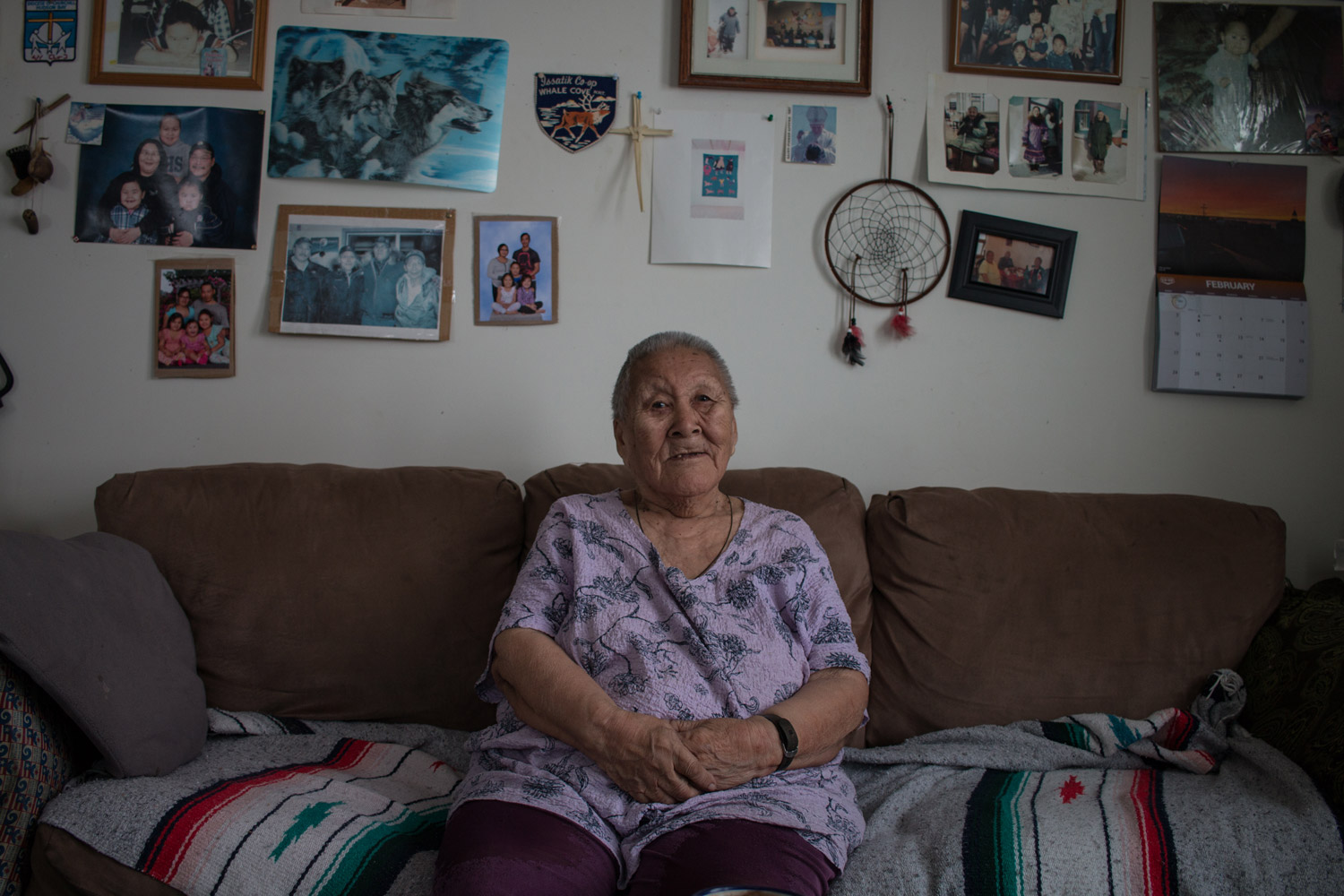
Agnes Teenar (Annissi Tiinnaaq) is one of Whale Cove’s oldest residents. Her family was one of the first to move to the community when the Canadian government began relocating Inuit there in the late 1950s.
My name is Agnes. The Catholic priests baptized me with that name. I stopped using my Inuktitut name after I got baptized.
When I was young, we lived at a camp called Mallirualik, near Back River. I spent a lot of time outdoors, and to this day, I love being outdoors. We lived in snow houses in the winter. There were different sections attached to a central igloo. In the summer, we had seal-skin and caribou tents. We sewed them together ourselves. We even used the underarms of the caribou pelts for windows.
There wasn’t always a lot of food around where we lived. We would go long distances by walking. The elders would have walking sticks, the adults would carry our knapsacks, and the dogs would carry the bundles of our supplies hanging on their sides. Our men made the decisions on where to travel and when, so we would follow wherever the caribou might be in the summer.
I have had two husbands over time. I eventually remarried after my first one died. My first husband was sent off for tuberculosis treatment to a sanatorium, and he never came back. To this day, we don’t know where he is or what happened to him.
It was my father-in-law that suggested to me that it was time to move on and marry Teenar. I was quite nervous because Teenar was already promised to another woman. He really wanted to marry me. He didn’t want to be married to the one he was promised to.
We got along really well. In fact, the Catholic priest here came along and said, “You two seem to make a peaceful couple.” I gave Teenar the freedom he needed. I didn’t keep him tied down, and I let him do what he wanted when he wanted, and I think that was the basis of our peaceful union.
We came to Whale Cove by Peterhead boats. There was absolutely no one living here. We were the first family. Shortly after we arrived, Sam Arualak’s family came. It was so good to be here. We used to dance a lot every day. We liked dancing so much, and the houses we had were so tiny, that we’d have to empty out the houses to make room for dancing. That husband of mine would take me and swing me right off the ground in a circle. He was a big man. One night we did so much dancing—you’re not going to believe this, but—we actually broke the floor. My goodness, that’s what we did.
I had eleven children. My oldest daughter was removed from Back River to go to residential school in Chesterfield Inlet. She came back much older.
I was a young adult when I became a culture teacher at the school. I was also a midwife. One time, we had a very frightening experience when a woman fainted while delivering a child, and she stayed in that state for a long time. Thank God I kept working on the woman and she came to.
She eventually moved to Arviat. Her little girl became an adult. When she found out who I was and that I had helped to deliver her, she named her little girl after me. I see her occasionally. That one that caused her mother to faint is an adult now, and she’s fine too.
I do worry about my children and my grandchildren—my family. My grandchildren would like the status of the Qablunaat. It hurts that they don’t speak Inuktitut. It’s all I ever heard spoken when I was raised. I hope they have good lives and that they can show loving and caring and sharing, and that’s what I try to tell them to live with. And I hope for the same for our community of Whale Cove.
I don’t say much about politics. I’ve tried to live a life of no conflict. That’s how I became eighty-seven years old, I think. It’s best to be peaceful. That’s what I hope for my children, my descendants in the community, that they can live in peace in the years that are coming upon us. (Translated from Inuktitut)
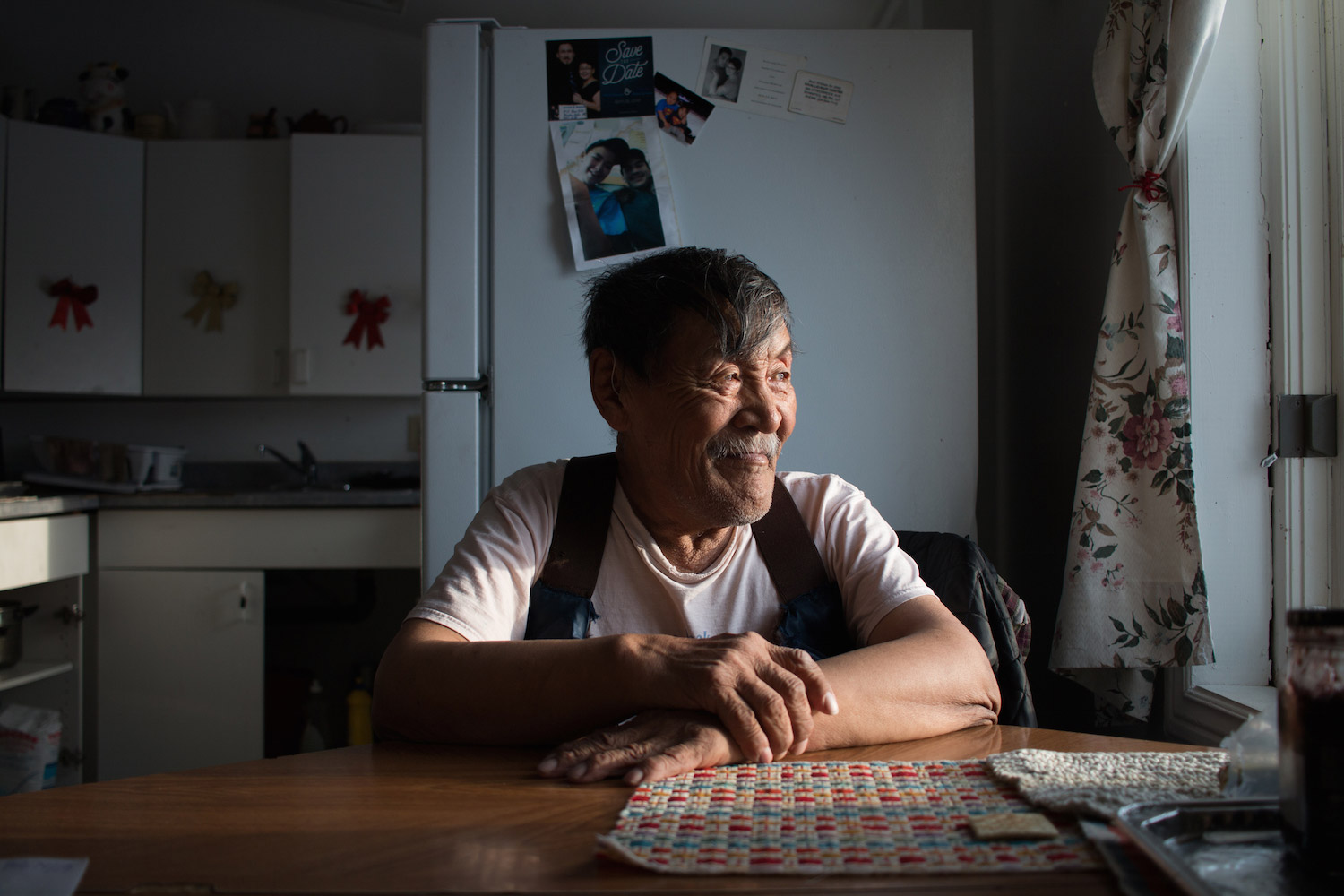
Samuel Arualak is Whale Cove’s Anglican reverend.
I had an older brother named Arualak. When my older brother died, his only name became my name, and I became Samuel Arualak. In the old days, we had only one name. Nowadays, people have far too many names.
I’m originally from Arviat. My father had two wives in his lifetime, so we had very many siblings. I had quite a few sisters, but I have few family members left from our family of origin.
I was very young when my father died, in 1949. My mother was originally from Arviat. I’m just not sure if my father was too. I have very good memories of being with my mother, who raised me so lovingly and carefully. I remember fishing very often with my mom after my father died. We survived on fish a lot.
I remember the way we used to live, the lifestyles we had. Our way of education was done by means of observation—by practical, hands-on exercising. There was no writing system at the time, and we learned all the skills we needed to survive. It was a very peaceful time of living for us.
In 1957, when I was nineteen, we were picked up in a bush plane by the RCMP from Arviat to work in Rankin Inlet. We moved to Rankin Inlet to work at the nickel mine there, my wife and I, before we had any children. Even if we didn’t agree or we didn’t want to go, we did what the RCMP said because we were intimidated. But it’s not like that anymore. We’re not afraid of them anymore.
I was a young man at the time. It was very, very emotional for me to deal with. Especially leaving our elders, my mother, and my stepfather, who needed our help. It was not right to leave them behind. My mother and my stepfather died in Churchill, Manitoba, while I was in Rankin Inlet. There was no farewell. It was terrible.
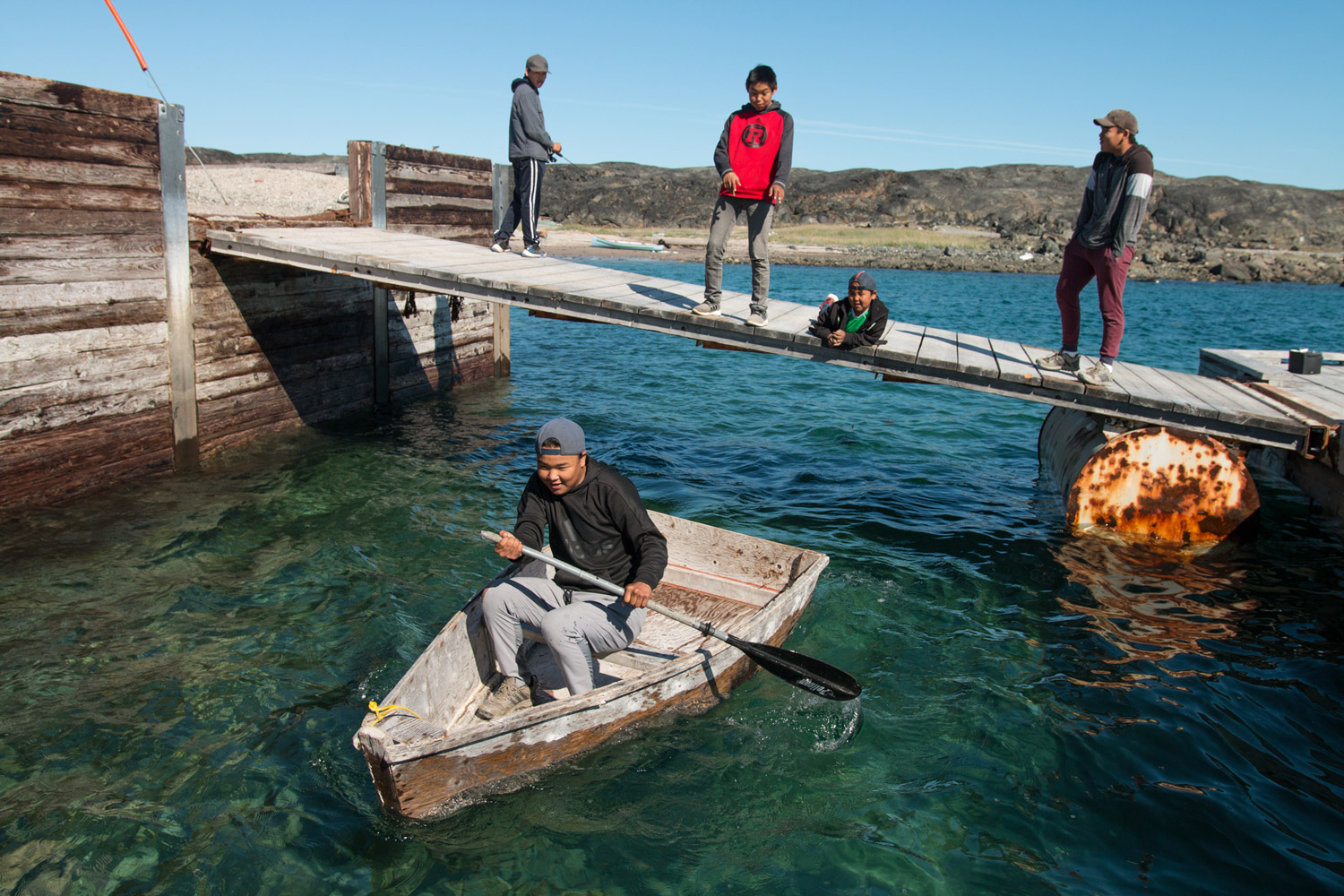
The first crew that got sent to the mine didn’t make a lot of money, even if we worked really hard. So it was not really worth it financially. The jobs didn’t alleviate poverty, because the wages were so low.
A social worker and an area administrator held a public meeting in Rankin. And so Simon Teenar of Ukkusiksalik, or Gjoa Haven, and I attended that meeting, whereupon the administrator asked if we would like to go back and live our cultural ways and move to Whale Cove, so we raised our hands and said we’d like to go. Lewis Voisey was one of the people that took us over by boat. And that’s how I ended up coming here in August of 1959. I’ve been here since.
When we got here, the land was just so beautiful. There were no buildings, just four tents. It was very clean, very natural. Even if we didn’t know one another at the time, we got along because we had the same values and cultures.
It was only when we relocated to Whale Cove and went back to being able to practise our traditional ways of culture that we became much better economically.
Our main goal was to get wildlife to feed ourselves, so we did it cooperatively. When we came here, there were no qamutiik, no sleds, no rifles, no dogs. Being that everything was administered out of Rankin Inlet, people there arranged to ship dogs for Inuit here in Whale Cove to start up their own dog teams. When we got those dogs, it really improved our lifestyle a great deal. We could hunt again, we could explore again, we could provide again, and we were back to our culture once again.
In 1960, I got a job as a government worker, building roads. I stayed in that job until the settlement became a hamlet in the 1970s. I also taught Inuktitut at the school for four years. Even as recently as September, I took the kids out on the land. When you give them the chance to kill a caribou, it’s pure joy. I will always remember my first tuktu. My parents actually had to borrow a rifle so that I would be able to shoot a caribou calf. I’m not very good with hunting sea mammals or fishing. But I will always remember my first caribou with a .22 rifle we used in those days.
I’ve always been involved with the Anglican Church since my childhood in Arviat. Over time, I’ve seen people who truly believe in God, but it’s not as consistent as it used to be. I’ve tried to never add anything to the Bible or the testaments as they are written. But I share more of my thoughts in my sermons nowadays, even though the instruction was we can never rewrite God’s word.
As you get older, you become disabled by all the ideas and ideology you once held. And so it’s important we remind our children that they have their youth and they have the energy. They are adaptable more than we are. Both the traditional culture and the presence of the government system are useful, but we need a balance. We need to focus on more literacy, both English and Inuktitut.
I will never stop hunting as long as I can do it. It’s a skill I was taught very thoroughly. It’s ingrained in myself, it defines who I am. It’s how I do things. It guides me, and it keeps me here. That’s how I’ve survived, that’s how Inuit have survived, with very little. (Translated from Inuktitut)
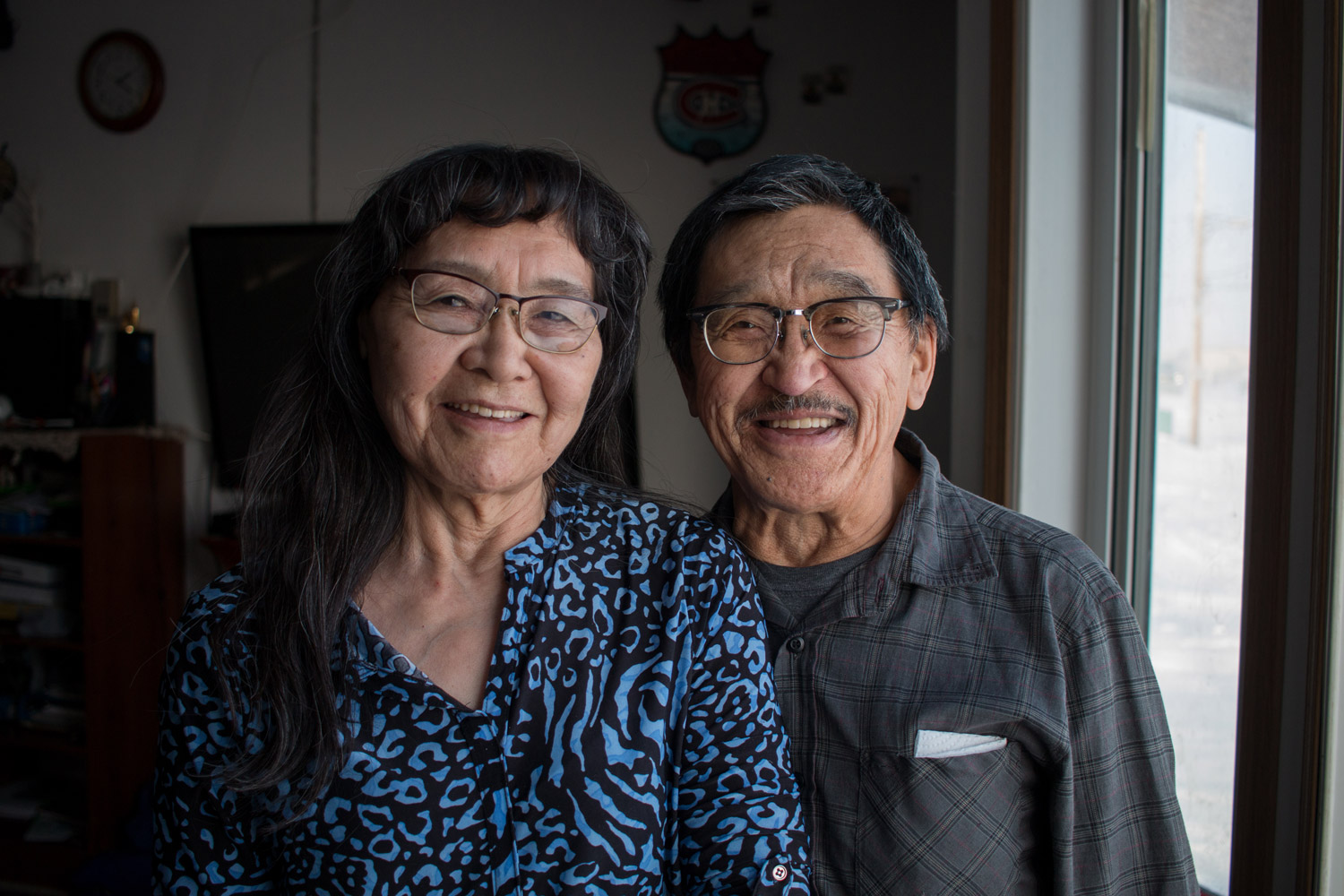
Susie and David Kritterdlik were relocated to Whale Cove from different parts of Nunavut and met when they were teenagers. This September marks their fifty-year wedding anniversary.
Susie: I grew up knowing my name was Aupilattunnguaq—but for short, Aupak. It means red flower. I’m named after my mother’s cousin’s brother, whose name is Aupilattunnguaq.
We originated from Garry Lake, north of Baker Lake, around the Back River area. Back in 1957, 1958, there was a famine happening in that area. My mother had mentioned two years before that there were already no more caribou. And it was also hard for us to get fish. My parents knew people were dying, and it was important for my dad to go and look for his brother, his older brother, to make sure he was still alive. So he had to leave us, just me and my mother and my younger sister, who was less than a year old. My two older sisters were at residential school at the time.
My mother had been trying to fish but with no luck. We didn’t eat for two or three days. As a little child, I was so eager to live. So I kept urging her, “Just go fishing, go fishing, go fishing.” And she said, “No, there’s nothing.” But I kept urging her and she did, and sure enough, by trying for maybe two days, she caught a fish. So me and my mother ate a little bit.
This was the day—of course I had eaten and was well off, now I was playing outside, and I remember just looking on the horizon. I knew my sisters were somewhere out there, and maybe because I knew that an airplane had picked them up to take them to residential school, I thought to myself, “I wish there could be a plane to pick us up.”
So I went into the tent—our tent was small. All we had was plywood. My mother was crouched down. When I looked at her, I thought, “She’s got no hope now,” and I was kind of worried. I told my mother, “I wish there could be a plane, an airplane to pick us up.” And you know, I can never forget it. She told me, “Don’t talk about things like that which will never happen. You know well there’s no one out there who knows where we are.”
Maybe the next day or that same day, you could hear the airplane circling us. There were three people in the plane: the pilot, Simon Teenar—Agnes Teenar’s husband—along with a government worker or whatever. They had been looking for survivors of the famine. And I guess Teenar was their main guide because he knew the area and he knew where families would be scattered.
We were brought to Baker Lake with some dead people in that same plane, the people that had starved that they had found. I remember very clearly seeing these dead bodies packed on one another. There were no seats on that big plane.
We lived in Baker Lake for about maybe five years. They sent me to Chesterfield Inlet for residential school along with my two older sisters.
My mother mentioned to me that when there was starvation going on, she and others walked over to this mission place and camped there so that they could be given food by the priests. One priest told her, “I cannot give you food because you don’t belong to our church. You’re not a Catholic.” And she said, “Okay, I’ll turn myself and, you know, become a Catholic so that my children can eat.” And that’s how we ended up going to Catholic church.
David: I was born in Arviat. My mother passed away when I was one or two years old. My father was taken to hospital—that was for TB—and he never came back to Arviat. I was adopted by Mary Ilitugak. She got married to Tommy Miseralak in Rankin Inlet. I grew up in Arviat until I was about six and we moved to Rankin for two or three years, and that’s when we came down here, when Whale Cove was just starting.
My family was one of the first few families that came to Whale Cove. It wasn’t so bad for us, because my father, who I was adopted to, already had dog teams and family members living in Rankin, so our family was doing okay.
Other families that were flown in from other places inland, those are the people who had a hard time getting adjusted to living on the coast. They didn’t have any idea about seal hunting or whale hunting or anything like that. The only way they knew how to hunt was caribou or fishing, and it was hard for them. Those who were better equipped were helping the other people who were moving in. I guess that’s always an Inuit tradition: wherever you see somebody in need, you help them.
Susie: In 1964, we were relocated to Whale Cove from Baker Lake. My parents didn’t have a choice. We didn’t know anyone, but my mother was a really outgoing person. She would talk to anyone. The people we started to meet here were mainly from the Ahiarmiut Ennadai Lake area, mainly from Arviat, and of course they started helping us out.
I had a mother who was always sick. So I quit school at the age of fifteen. The government was starting to hire Inuit in the classroom. And because I had the highest grade level here in Whale Cove, and because I spoke both Inuktitut and English and can write both English and Inuktitut, they offered me this half-time position as a classroom assistant.
I met David when I was sixteen years old. But because I was so wanting to support my mom, my family, because of the famine that I remembered so well, I had a plan of my own. I wanted to be single and support my family, my parents, all my life. And I was going to do that—until I met David.
We were just friends for a while. But it came to a point where we wanted to be together all the time. At that time, our parents were not agreeing for us to be together because I came from Garry Lake area, different culture, different dialect. I was Catholic. He was Anglican.
At first, we were secretly seeing each other because they didn’t want us to be together. I don’t know how it happened, but they finally agreed. I guess they started talking to each other: “If we cannot separate them, it’s better if they stay together.”
So that’s how that we started our life together—very tough. I keep telling myself, I’m so glad I was working. I had a half-time job at least. And then, after a year, we had a child.
When our eldest daughter was seven years old, we adopted our second child. In Inuit culture, our parents had a strong belief in having their child grow up with both parents. Our first adopted child came from my younger sister, who was single at the time. Although she had been living with someone, they were not married. That’s when they asked us if we could adopt their baby.
Although we were not prepared, love comes first. And that’s how we adopted our second child, and it was similar with the other three children we adopted. We took those children as our own because we wanted our own children. And then our youngest one, he’s our biological son.
We didn’t want our kids to go through what we went through, but they’re going through things exactly as we did by different means of having to survive and adjust. But they have such little knowledge about our tradition and culture now. And most of them don’t speak Inuktitut anymore. In Whale Cove, there are so many different dialects, so our kids have come up with their own dialect. They understand one another. They come up with words, they make it up. So we have our own little words in Whale Cove.
David: Over the last decade, several new gold mines have begun operating in the Kivalliq. When they first started hiring local Inuit, and the local Inuit hired kept quitting their jobs and staying home, the comments that were coming from our government or the mine were that Inuit don’t like to work. “They don’t want to work. They don’t like hard work.” It’s not that. It’s that Inuit want to be home with their families. Families come first. That’s why the problem with keeping young local people up at the mine was a problem—and it still is, because family comes first for Inuit.
The only thing I know about living in Whale Cove is the longer you live somewhere, the more you want to stay. And oftentimes, elders who move out of Whale Cove, some of them come back here because, for people like myself, we moved out of Whale Cove a number of times. We keep coming back, I guess. We know the land, we know the people. It’s hard to start a family or have a family where you didn’t originally grow up. You know the area, you know where to go for fishing or hunting.
The majority of our children chose to stay in Whale Cove, except for our oldest daughter, who has been living in Rankin with her family. And the rest, they want to stay in Whale Cove.
Susie: We’ve been together for forty-nine years. Fifty years in September. Since we’ve been together so many years, it’s hard to be apart now. There’s more love between us. Illa. And our kids, I hope that they’ll see that too and have more hope in their marriages.
Last year, David said to me, “I bought this ring for you because I had no chance of buying you something like that when we were getting married at our wedding. Remember, you had to borrow my mother-in-law’s wedding ring? So this I give you because I love you, and I’m giving it to you from me.” And, my goodness, of course I started crying. My own wedding band. After forty-eight years. I was so proud.
The successful side of being together is both of us are committed. I’ve grown up with hardship, watching my siblings having to suffer. I myself have struggled. And knowing I have survived it, I know I can survive anything. That’s my strength.
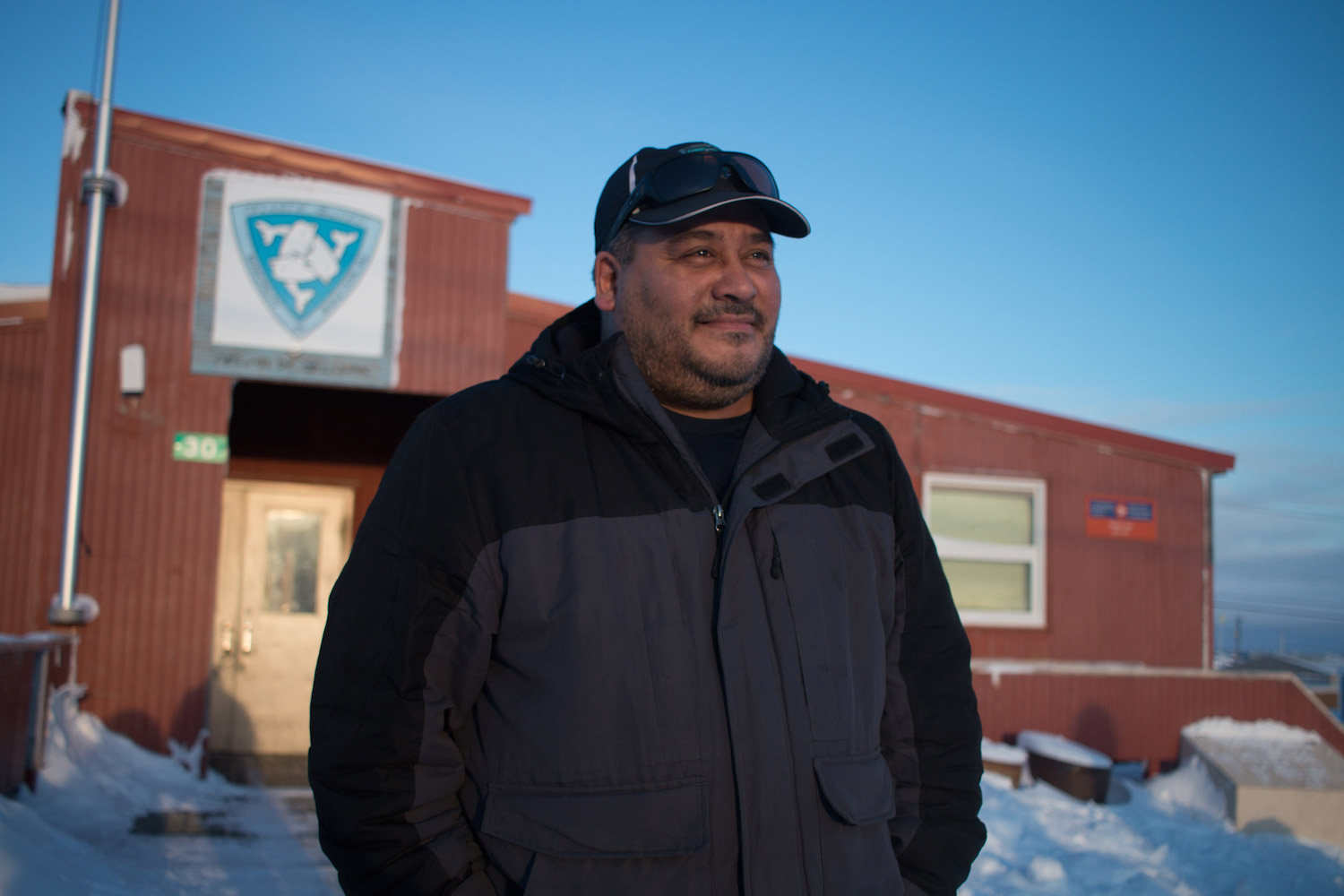
Stanley Adjuk is the mayor of Whale Cove.
We always have to fight that extra mile in Whale Cove. It’s not like other communities. We’ve had this boil-water advisory for four years in a row now. The territorial government wants to get that water plant fixed up. If Whale Cove was a bigger centre like Arviat or Rankin Inlet it would’ve been dealt with, done, finished. There’s a bit of money we use from the hamlet to be able to get ice from the lake and deliver it to the community, because that ice water is so much better than tap.
That’s how hard these smaller communities have to fight with our own territorial government. In fact, I’ve heard people in the Nunavut Legislative Assembly say that small communities aren’t viable in the North. I’ve heard that. And I’ve told the premier that if they ever say that again, I’m suing our own government. It stresses out people. They’ll never pay us enough money to move anymore. We’ve gotten to love this place.
I was born in Churchill. My family was moved here to Whale Cove back in 1964 from Garry Lake. From what I know, there was starvation in Garry Lake, so my family went to Baker, and then from Baker they were moved—from inland to the coast.
I started my education here in Whale Cove. At the time, it went from beginners to grade nine in our school system. My parents, three of their daughters were just taken from them and brought to school in Chester. When I was on my grade nine, I told my parents that the teacher was confident I was gonna finish my school here now and go to high school in Iqaluit or Yellowknife. First thing they said to me was, “You’re not going.” That’s when I just dropped out of school right there. I guess they knew something.
I ran for council back in ’92, and I got in. There were people that were pushing me to go in. I was twenty-two, maybe? It was like going back to school.
I have been mayor twice, from 1997 to 2002 and from 2012 until now. When you don’t have the diploma of a grade twelve, you tend to work harder to get what that grade-twelve person has. I wanted to learn more, and I knew I could help the community at the time. When you understand English and Inuktitut, that’s a big help.
In the region, there are a lot of graduates now without any jobs. I’ve always been supporting mining, even though I want my land the way it is, without being touched. Young people have to be busy. Not just young, even the older people, if they’re not busy doing work, they’re going to hunt caribou and sell it, because it’s money. We were always taught when we were harvesting fish or caribou to get only what you need. When we were kids, hunters would share all the time. Today, they’re getting more than what they need and more to sell. Once in a while, you listen to the radio and hear, “I wanna buy this part of a caribou,” which is sad. I’m not used to it.
I hope in twenty years’ time Whale Cove will have its own member in Nunavut’s legislative assembly and a lot more infrastructure for kids. It’s never anything to brag about, but many say Whale Cove has the least suicides in Nunavut. That’s because we’re a tight-knit community and we still help each other. And we still make sure our young people are active.
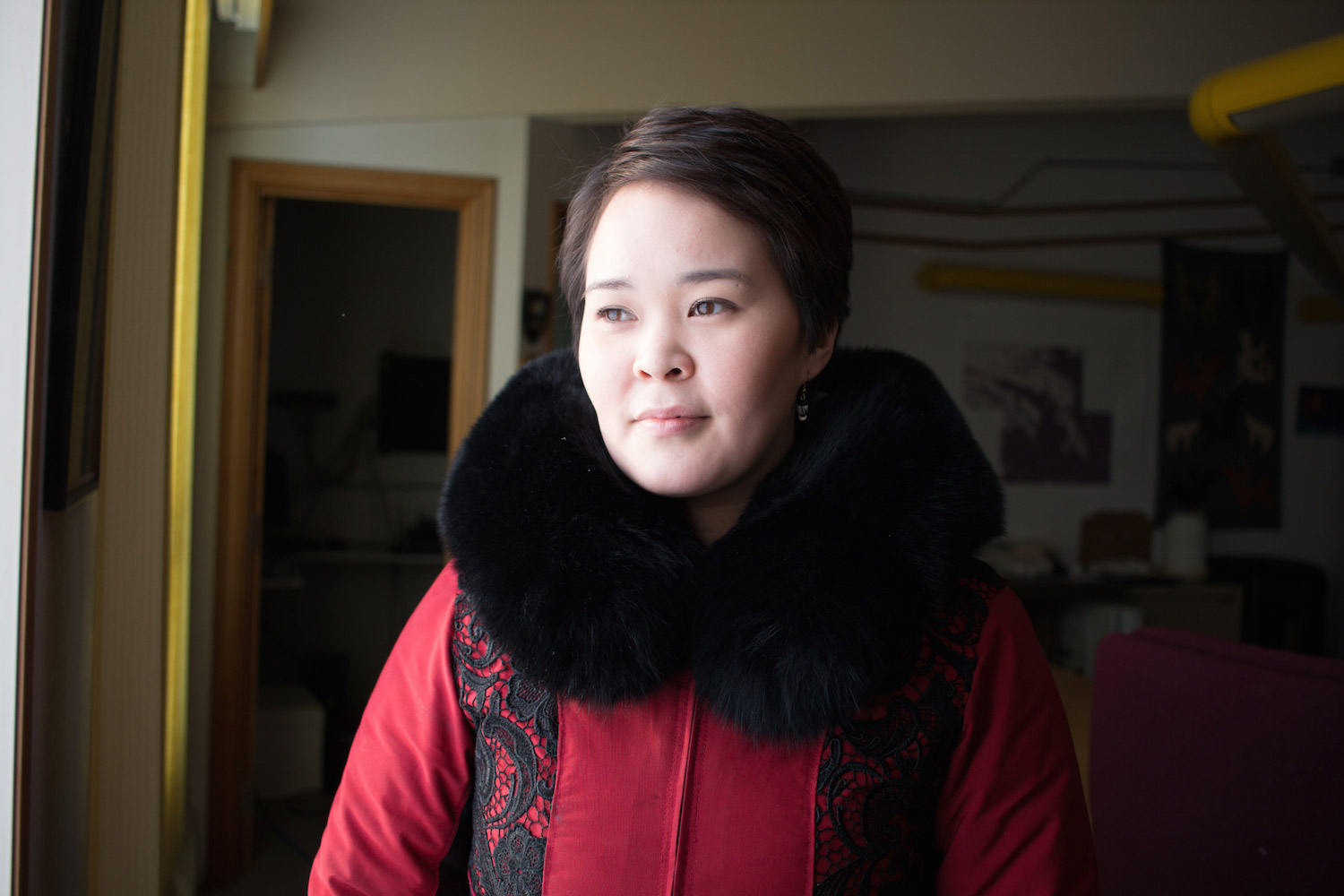
Molly Okalik is a twenty-four-year-old mother of three and grew up in Whale Cove. She is the community’s recreation coordinator.
My Inuktitut name is Ijakak. That’s my grandma’s name. That was my dad’s mom. And I’m named after the late Uluqsit. My mom had a dream about him in which he said he wanted me to be named after him.
Growing up in Whale Cove, there was always a fishing derby, and that was one thing we would always look forward to. There’s one place we would go every year and never had luck, but we’d go there anyways because my dad’s the driver.
I started a family really young, and I had two of my kids when I finished high school. They were my motivation. Like, “I have to do this for them and continue to get an education so I can provide for them.”
I was pregnant when I was in college in Iqaluit. I took at least a week off of school after giving birth. Luckily, my instructors didn’t mind me taking my baby to class. But I couldn’t focus, so I left her at home and finished. And it was pretty hard. I didn’t get the certificate, but I finished.
A few years later, I went back to college, this time in Rankin Inlet. Moving to a different community—a whole different environment, a bigger place—it took a while for me to get used to it, but I did.
When I finished, I had no job or housing. I had no choice but to move back to Whale Cove. I got a full-time job as recreation coordinator. I didn’t think I was going to get a job again in a small community, especially full time. And after two years of living in your own home, illa like your own space, and moving back to your mum’s house, your parents’ house, that was tough.
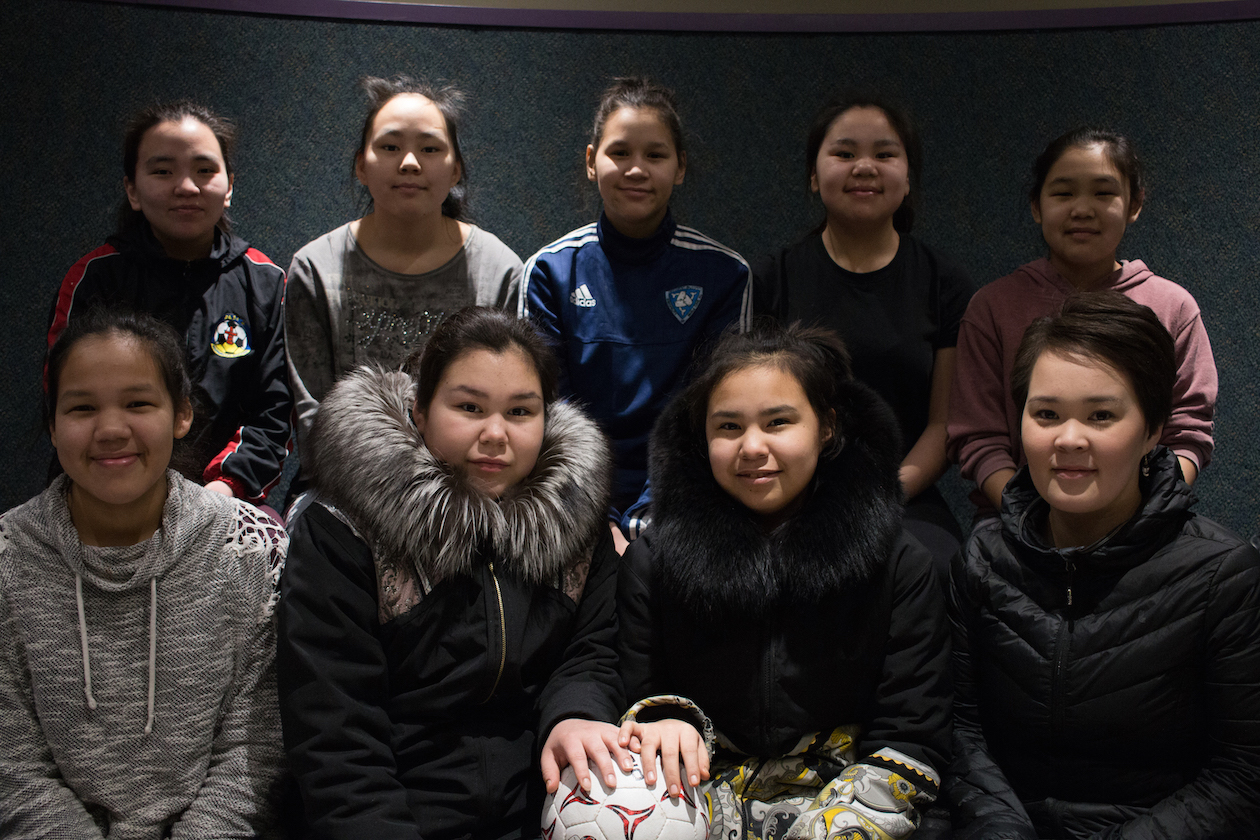
When I was in school still, I used to be involved in sports. Soccer was my favourite growing up. Back then, we didn’t have anyone willing to put in the effort with fundraising and getting a team to tournaments. Since I started my job, it’s helped me wanna fundraise for all the other kids: soccer, basketball, hockey, all those other sports.
This winter, I helped put together the girls’ soccer team that competed in the U-15 territorial soccer tournament. I had received an email about the territorial tournament happening in Rankin. I talked to one of the teachers, and I told her, “We should get a team going.” So we put out a poster saying there’s going to be tryouts, and then we got a team. My little sister Diana was their coach. And we told the players, “You guys are going to have to help us fundraise, you guys are going to have to attend practices and make sure you’re 100 percent into it.” It was kind of hard at the beginning, but once it got closer, they were pumped up, and they were running bake sales, penny sales, bingo, movie nights.
Our gold-medal game in Rankin, that was intense for us, because we were losing one–nothing. But then one of the Iqaluit players did something to one of our girls in the goalie crease. That was a penalty shot, and we tied the game.
From there, the team got pumped. The time was up, so we went to shootout. The first shot went to Iqaluit, and the shooter missed. And then it was one of our girls, and she scored. Then the whole team ran to her, and the ref started whistling and saying, “You guys didn’t win yet, you guys didn’t win yet.” And then Iqaluit shot again, and it hit the post and never went in. Then it was our turn again. It was either Adina or Macy—one of them shot, it went in. Then the ref whistled three times, and then we started jumping. Everyone started cheering. It was probably the best feeling ever.
The community was very, very happy for the girls, because they’re so young, all under fifteen, and for a small community to beat a city—because Iqaluit is considered a city, a bigger community—it’s something to be very proud of for us small communities.
I know living in a small community can become really hard and dark when you’re growing up. Sports are an escape, especially in small communities—they’re an escape from whatever people are going through. There are more opportunities for these kids, and I can tell they need to be seen, and they have more to life than just living here and being stuck in a small community.
I know it’s home, but as a young person you want to explore, get outside of your bubble, what you’re used to. Home will never move anywhere. You’ll eventually have time to go home and visit family. And me thinking of my kids all the time, I want my kids to experience growing up in a city or in a different community—to have more opportunities that I didn’t have growing up here.
I think it would be a huge change for them. They would have to adapt to that. I’ve lived in Nunavut all my life and never had the opportunity. I want my kids to know our traditions, because that is how we have survived. It’s harsh sometimes living in the North, but you still survive. You learn to adapt to your surroundings and a new lifestyle.
Glossary
Qablunaat: Non-Inuit, non-Indigenous people
Qamutiik: Sleds
Tuktu: Caribou
Illa: An expression similar to “Well” or “Yes, well…” in English


